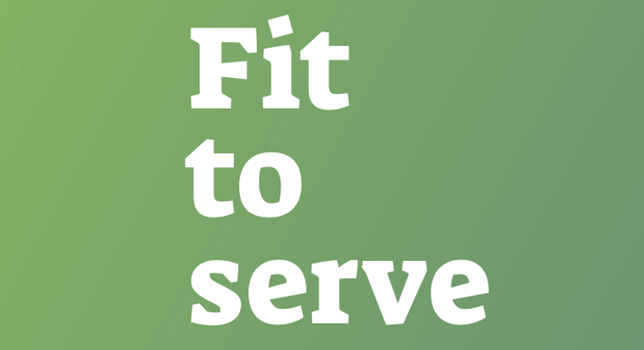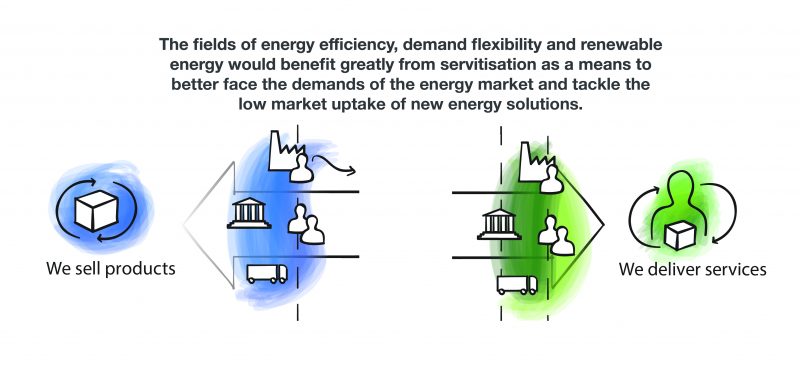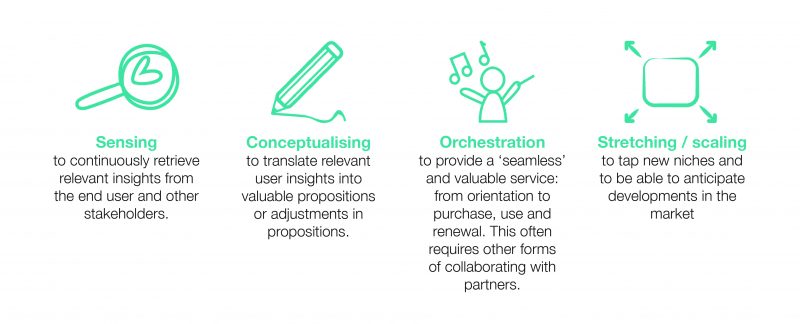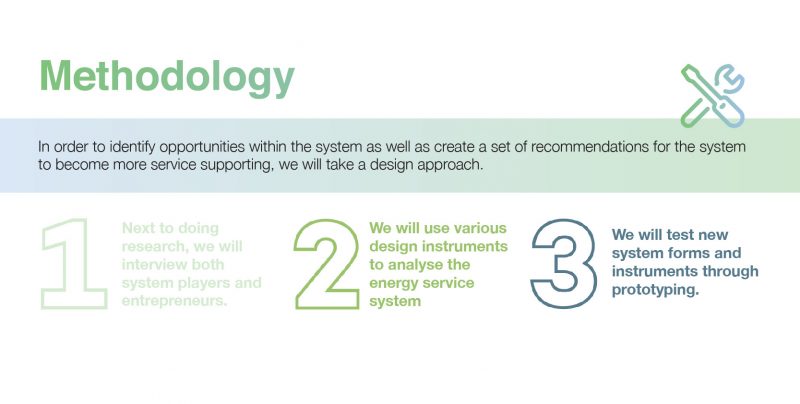
This Task focused on identifying measures and instruments that support the creation and uptake of user-centered energy services and new energy business models. The work program has now ended and all outputs can be found on the Fit to Serve website: https://www.fittoserve.eu/
Politicians, policy makers and scientists all over the globe emphasise the urge to speed up the process of creating new measures to reduce CO2 emissions, as well as stimulate the production and use of renewable energy. This sense of urgency for energy transition is also felt by many entrepreneurs who expect it to lead to new – big – business opportunities. Although some become successful, many businesses never outgrow their experimental stage and are still awaiting their big breakthrough.

One of the explanations for this shortcoming is the technocratic and product-oriented approach of the energy market and its players. Earlier research shows that many energy business models are not designed to meet the expectations of the contemporary energy user. Most of the business models in the energy market are traditionally product-oriented, focusing on the moment of purchase, instead of providing long-term value during use. This causes a ‘mismatch’ between the business models of energy solutions and the demands of the energy market, and consequently leads to a low market uptake of new energy solutions.
Nowadays, however, most consumer products and solutions are a combination of a product and a service, or even a full service-based proposition. Think of famous examples like Spotify and AirBnB: services providing value to the user during the use phase, enabled by smart and innovative technologies. The energy transition is, in fact, a transition from energy products towards user-centered energy services.
The fields of energy efficiency, demand flexibility and renewable energy would benefit greatly from servitisation as a means to better face the demands of the energy market and tackle the low market uptake of new energy solutions.
As most of the companies in the field of energy originate from technological backgrounds, their businesses are built to exploit innovative technologies. Entrepreneurs will not only need to adjust their business model. Training or developing complementary servicing skills or capabilities is a key success factor. Previous research found the following capabilities to be crucial when running a service-oriented business:

Sensing: the ability to continuously retrieve relevant insights from the end user and other stakeholders.
Conceptualising: the ability to translate relevant user insights into valuable propositions or adjustments in propositions.
Orchestration: the ability to provide a ‘seamless’ and valuable service: from the orientation phase, to purchase, use and renewal. This often also requires other forms of collaborating with partners.
Stretching / scaling: the ability to tap new niches and to be able to anticipate developments.
However, developing one’s own business model and the right capabilities is not enough. Both service- and product-oriented business models operate in a broader context: a system. This system consists of many stakeholders, like policy makers, lawmakers, researchers, financial institutions, competitors, end users and other stakeholders that are of influence. These stakeholders play an important, sometimes even decisive role, in the creation and uptake of energy services. However, their role might not always be supporting or stimulating of the success of new services. Our research has shown that funding, subsidy, rules and legislation, as well as other forms of support, have been developed to support the creation and uptake of single products and technologies, not services. Many instruments and measures need to be adjusted or rethought to become what they aim to be. Supporting the uptake of successful energy services and integrated product/technology systems. We are lacking a service-supporting energy system.
Task 25 focuses on this system:
A service-supporting system consists of players and instruments that are designed to support new user-friendly energy services: backed up with service-oriented business models, created by entrepreneurs equipped with proper service-oriented capabilities. Only then will new energy services flourish.
In our work we will focus on key issues:
In order to identify opportunities within the system as well as create a set of recommendations for the system to become more service supporting, we will take a design approach.

Semi-structured interviews
A generative interview toolkit to interview key stakeholders is used to gain in-depth knowledge about the actors and the actor’s perception of the system.
Analysis
Insights are distilled from interviews using analysis formats provided. Insights will be discussed during plenary workshops.
Prototyping
Based on insights, (partial) solutions will be developed as prototypes and tested. Based on these tests, and the projects as a whole, recommendations will be developed.
We envision a flourishing energy services system, in which supply and demand overlap. We want to create a new set of instruments that support the creation and uptake of user-centred energy services. Instruments that enable entrepreneurs to sense what users value, to conceptualise that kind of energy service answers their user’s needs, to orchestrate the energy service experience in a seamless fashion and to stretch and scale existing energy services to meet a wider audience. Only then can we tackle the energy, which is in the interest of all energy service system players – from local governments responsible for municipality emissions to banks providing loans for sustainable home renovations.
To create better instruments we need to know how we can help entrepreneurs deliver and enable the creation and uptake of energy services. If you have a case available for our research, or if you as a system player have thoughts on ways to improve the system, we would love to explore this with you, in close collaboration.
Different subtasks in phase 2 include:
Developing a shortlist for case selection
Case analysis using provided format
Research different cases
Semi-structured interviews with sampled entrepreneurs
Semi-structured interviews with system players
In-depth analysis of data gathered from interviews using provided format. Share insights
Developing tests and prototypes based on insights.
Present learnings from research and tests
Disseminate and communicate findings
Develop and share recommendations
D7: visual and pragmatic overview of business model strategies (business model, entrepreneurial capabilities and context stretch or fit actions) for each investigated sector or type of business, including a comparative analysis across countries; in addition a more detailed report will be provided.
D8: Overview of the different types of policy and institutional support available to the different types of business models, where relevant country context and sector context sensitive.
D9: Training road show and living lab interventions
D10: Outreach and dissemination material, includng at least 2 academic/journal publications, potentially a MOOC, and other outreach material highlighting the Task’s work.
The Fit to Serve website provides an overview of our learnings, methodologies, publications and example cases from the energy sector.
Fit to Serve? The story about energy service supporting business models and systems https://doi.org/10.47568/2XR109
Mourik, R.M., Bouwknegt, R. (2021)
Energy Service Business Models and Entrepreneurial Skills: Identifying Models and Patterns
Mourik, R.M., Bouwknegt, R. (2021). Presented at the Sustainable Places 2020, Online, 28–30 October 2020
Agency by institutional entrepreneurs in the energy transition
Den Hartog, F (2020). Master thesis, Msc. Urban Environmental Management Wageningen University. Commissioned by: Duneworks / dr. Ruth Mourik, supervisor: dr. Jos Bijman, co-supervisor: dr. Gerben van der Velde
Den Hartog, F (2019). Literature research report, Msc. Urban Environmental Management Wageningen University
Task 25: Business Models for a More Effective Market Uptake of DSM Energy Services (2016).
Tolkamp, J., Huijben, J.C.C.M., Mourik, R.M., Verbong, G.P.J., & Bouwknegt, R. (2018). User-centered sustainable business model design: The case of energy efficiency services in the Netherlands. Journal of Cleaner Production, 182, 755-764.
Video presentation: “Energy service supporting business models and systems”
Australia, Ireland, Netherlands, Sweden
Annex duration: November 2018 – November 2020
| Name | Role | Country | |
|---|---|---|---|
| Ruth Mourik | Operating Agent | Netherlands | ruth.mourik@duneworks.nl |
| Tony Fullelove | National Expert | Australia | tony.fullelove@monash.edu |
| Joanna Southernwood | National Expert | Ireland | jo.southernwood@ierc.ie |
| Matthew Kennedy | National Expert | Ireland | matthew.kennedy@ierc.ie |
| Renske Bouwknegt | National Expert | Netherlands | renske@ideate.nl |
| Lotta Bångens | National Expert | Sweden | lotta.bangens@aton.se |